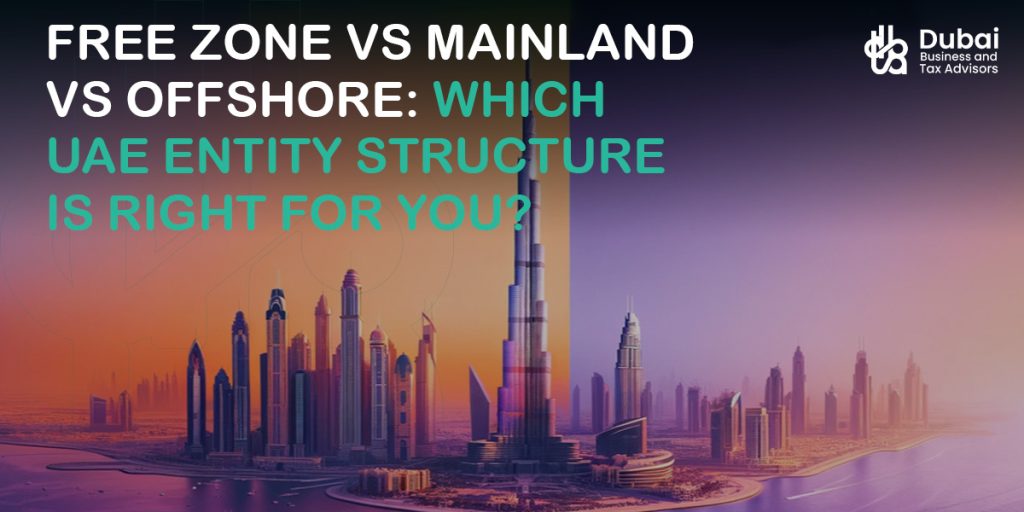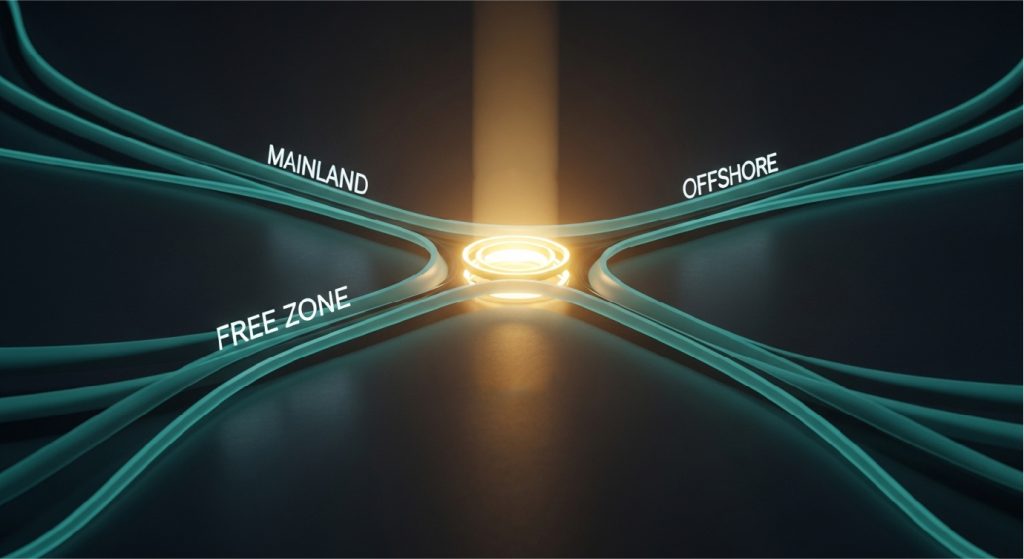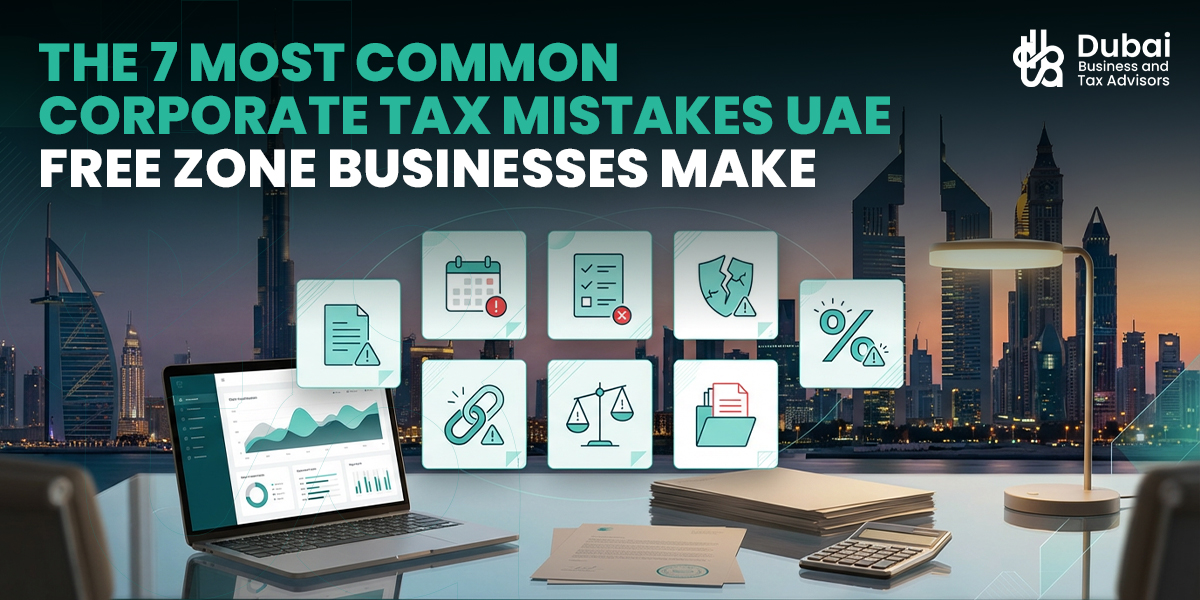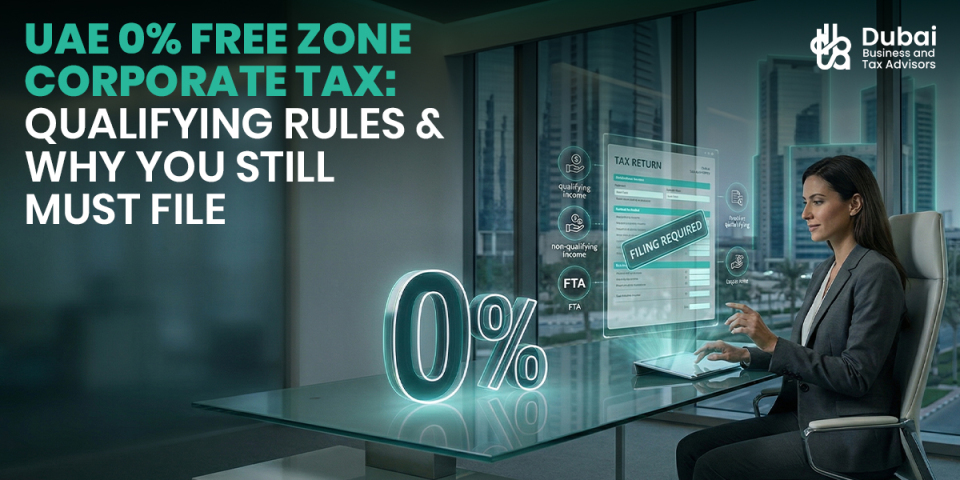Free Zone vs Mainland vs Offshore: Which UAE Entity Structure Is Right for You?
Recent Insights

Table of Contents
10 Steps to Set Up Your UAE Business the Right Way
10 Steps to Set Up Your UAE Business the Right Way

Introduction:
The UAE has, for a long time, been a top location for venture capitalists. Because of its place, tax-free incentives, and a modern infrastructure, it has many opportunities. If you are looking to establish a business in the country, your first choice is to choose the correct legal structure. If you decide to go with a mainland, free Zone or offshore company, this choice affects everything from who runs the company to the way it functions and how it reaches customers. This guide will break down the various UAE corporate registration forms to make it easier to know the options available and pick the one that best suits your requirements. The possibility of starting an enterprise in the UAE has a lot of possibilities; however, it is important to be aware of your options. The tax-free setting and access to the world market are extremely appealing, but you must select the best setup. This guide will discuss the advantages and disadvantages of each choice to help in making an educated choice without doubt.
Understanding the Pillars of UAE Company Structures
It is believed that the UAE commercial environment has three primary business structures, each specifically created to accommodate various kinds of companies. Below is a detailed breakdown of each one:
Mainland Companies: They are regulated through the Department of Economic Development (DED) in the specific Emirate. They are permitted to operate anywhere in the UAE and globally and internationally, which makes them a popular option for those who want to have broad market access.
Free Zone Businesses: These are companies established in specific zones, each with particular rules and rules and. Free zones are generally intended for companies that are focused on international trade and provide specific benefits such as tax exemptions. If you are considering the choice of a free zone or mainland Dubai, it could be among the most frequent challenges faced by newcomers.
Offshore Companies: These are entities that have been established mostly for the purpose of holding assets and managing international affairs, and providing security and confidentiality. However, they are unable to operate within the UAE within the UAE. In this article, we will go deeper into these types of companies to help you determine the UAE business set-up choices that will best serve your long-term objectives.
The Mainland Company: Your Gateway to the Local Market
A mainland company based in the UAE is a great option for businesses that want to be involved directly in their local market. They are controlled under the DED of the particular Emirate and are the only kind of company that can trade across the entire UAE. If you are deciding between the mainland or free zone configuration, this is usually the primary factor for people: access to the local market.
Key Characteristics and Legal Framework:
The DED is the authority for mainland businesses. Recent amendments in the Commercial Companies Law make it easier for foreign investors to establish their businesses in the UAE. The past was when local sponsors holding 51% of shares was the norm, but today, most companies permit the ownership of 100% by foreigners, which gives investors total control, without needing a local partner. This change has made companies from mainland countries particularly attractive for investors who are looking for more control over their business.
Advantages of a Mainland Company:
Free Market Access: This is the greatest benefit of a mainland business. It can operate in a free manner throughout the UAE, including shopping centers as well as government departments, as well as other businesses from mainland companies. If you are deciding between the advantages of free zones vs mainland Dubai, it is one of the main factors that makes mainland businesses stand apart.
Flexible Business Activity: The DED provides more than 2,000 types of business operations that allow for a wide choice of options for commercial, industrial, professional, and licensing. Business owners have the freedom to expand their business operations into different industries.
Broader Scope of Operation: In contrast to free zone businesses that are typically limited to a specific area, a mainland-based company can open multiple branches across several Emirates. It is also able to participate in government projects, which expands its scope far beyond the free Zone.
Visa Allocation: One advantage of being a company based in mainland China is that there is no fixed number of visas they can apply for. Its number of visa applications granted depends on the size of the office space, which allows the business more room to expand and recruit more employees as required.
Disadvantages and Considerations:
Higher costs: A disadvantage is that establishing and renewing a mainland business is more costly than a non-free zone business. This is because of the expenses from government agencies, the requirement for office space and other compliance requirements.
More complicated setup process: The setup process may take longer, as you will require approval from various government agencies and departments, depending on the specifics of your company.
Corporate Tax: While the UAE has a corporate tax of 9% on earnings that exceed AED 375,000, companies in mainland countries will be more affected by this tax. As a contrast, a lot of companies operating in free zones benefit from tax exemptions.
The Free Zone Company: A Hub for International Trade
The growth of free zones has played an important part in helping to establish the UAE as the world’s leader in logistics and trade. With more than 45 free zones in the country that cater to different industries and sectors, the free zone business UAE model provides an excellent opportunity, particularly for businesses that focus on international marketplaces. The advantages of free zone businesses in the UAE are attractive to foreign investors seeking an easier arrangement.
Key Characteristics and Legal Framework:
Every FREE zone operates under the supervision of its individual Free Zone Authority (FZA) that oversees registration, visa procedures, and business rules. This provides free zones with independence and efficiency, which makes the process of setting them up. A few well-known free zones in Dubai comprise those like the Dubai International Financial Centre (DIFC) for finance, Jebel Ali Free Zone (JAFZA) for logistics, as well as Dubai Media City to support the media industry.
Advantages of a Free Zone Company
100 percent Foreign Ownership: The main benefit of establishing a free zone in the UAE is the ability to be in complete control over the business. In contrast to enterprises in mainland nations, which typically need local partnerships, free zone companies have always been able to be completely controlled by foreign investment.
Full Repatriation Capital and Profits: one of its main advantages is the possibility to transfer all your capital and earnings back to your country of origin with no restrictions. This is crucial for investors wanting to maximize the value of their investment as well as remain flexible with their finances. ces. Tax benefits. One of the main benefits of having a free zone business inside the UAE is the tax-free status of 0% on both corporate and personal tax on income for a specified period that is usually renewed.
Although the UAE has introduced a corporate tax, a lot of businesses in free zones that are “Qualifying Free Zone Person” are not required to pay. Additionally, the free zones typically offer exemptions from customs duties on imports and exports, which makes them an excellent option for trade. Business setup that is streamlined business setup UAE rules for business in Free Zones were designed to be easy and effective. The process of establishing a business in a free zone is usually quicker. It involves an easier procedure, typically employing a single-window approach for applications, which is administered by the Free Zone Authority (FZA).
Industry-specific ecosystems: Numerous free zones are targeted toward specific industries, creating an ecosystem of businesses that share the same goals. These zones offer a specialized infrastructure and a network of companies that provide a secure and stable setting for growth and collaboration.
Disadvantages and Considerations
Restricted Access to Market Access The biggest drawback of free zones and in the heart of the freezone versus. The mainland debate is the inability to do transactions with mainland companies. To conduct business in the mainland free zone, businesses operating in the free zone have to either establish an independent branch in mainland China or find an authorized distributor on the local market, which results in higher costs and administrative processes. Visa Quotas: Free zone businesses generally have a limited number of visas they are able to apply for.
It is typically based on the dimensions of the office space or the business plan they choose. This may limit the expansion when you employ more employees. Higher Compliance Mainland Trading: If a free zone company plans to conduct business on the mainland, it must be compliant with the free zone and laws applicable to mainland businesses, which could be complicated. Do not have any Government Contracts Businesses in the free zone are not allowed to make bids on government and public sector contracts, which limits the opportunities available to businesses.
The Offshore Company: Asset Protection and Global Business
A company offshore in the UAE is a great option for investors whose operations are mostly outside the UAE. Although these businesses cannot be in the UAE, they are best suited to handling assets and international business and securing wealth. Offshore and the traditional UAE business model stand out as two distinct methods of business.
Key Characteristics and Legal Framework
Offshore companies are supervised by offshore authorities like Ras Al Khaimah International Corporate Centre (RAK ICC) and the Jebel Ali Free Zone Authority (JAFZA). The title also knows about International Business Companies (IBCs).
Advantages of an Offshore Company
100% Repatriation and Foreign Ownership, like free zone businesses, offshore businesses allow for fully foreign ownership, and investors can also transfer the entirety of their earnings and capital into their country of origin, without limitations.
Absolute Confidentiality: Offshore businesses have security in mind. They provide a high degree of privacy to those who are the Ultimate Beneficial Owner (UBO) and information about the company, which makes them perfect for those who value the privacy of their clients.
Asset Security: The asset protection aspect is among the top benefits of establishing an offshore business. Offshore structures are a great tool to protect investment, assets, as well as intellectual property. They provide additional security from risks.
Cost-effective: Establishing an offshore business in the UAE is often one of the most affordable alternatives. In contrast to free zone or mainland setups, there is no requirement to have a physical office or visas for a business owner, keeping costs down.
Disadvantages and Considerations
There is no local trading. The main restriction for offshore companies is that they are unable to engage in business within the UAE. This means they cannot rent office space, employ employees, or apply for a UAE visa for business.
No access to UAE Residence: The fact that you own an offshore business does not give you the right to get a UAE residency visa, which renders you ineligible for those who want to reside and work in the UAE. There is no physical presence. Offshore businesses do not have any physical presence in the UAE. This is a challenge for dealing with certain international banks and financial institutions, which require a physical location or local operation to create accounts.
The Ultimate Comparison: Mainland vs Free Zone vs Offshore
To aid you in making your choice, you to make your decision easier, here is a quick overview of mainland, free zone, as well as offshore business structures. This table outlines the main variations and gives you an overview of the benefits and drawbacks of each setup that will allow you to pick the most suitable structure for your company.

Not Sure Which UAE Entity Fits Your Business? Let Us Help.
Schedule a free 30-minute call with a senior international tax advisor at DBTA. We’ll walk you through the ideal structure for your business and timeline.

Feature Mainland Company Free Zone Company Offshore Company
Ownership: 100% foreign ownership for most activities. Business Scope Unlimited access to the entire UAE market and international markets. Can bid on government contracts. Can operate within the Free Zone and internationally. Restricted from trading with the mainland without a partner or branch. Cannot conduct any business in the UAE. Used for international business and asset holding.
Visa Eligibility: Unlimited visas based on office space size. Limited visas based on package/office space. No visas issued. Office Space Mandatory physical office space required. Can opt for flexi-desks, shared offices, or physical offices; no physical office required. Taxation 9% corporate tax on profits exceeding AED 375,000. 0% corporate tax for qualifying companies. No import/export duties within the free Zone. No corporate tax or personal income tax.
Setup Cost: Higher, generally more affordable, and most cost-effective
Audit & Compliance: Mandatory annual audit and stricter regulatory Compliance. Varies by free Zone; some require audits, some do not. No yearly audit required.
Primary Use Case: Companies targeting the local UAE market, retail, and services. Businesses focused on international trade, e-commerce, and specific sectors. Holding assets, global trading, and wealth management.
| Feature | Mainland Company | Free Zone Company | Offshore Company |
|---|---|---|---|
| Ownership | 100% foreign ownership for most activities | 100% foreign ownership | 100% foreign ownership |
| Business Scope | Unlimited access to the entire UAE market and international markets. Can bid on government contracts. | Can operate within the free zone and internationally. Restricted from trading with mainland countries without a partner or branch. | Cannot conduct any business in the UAE. Used for international business and asset holding. |
| Visa Eligibility | Unlimited visas based on office space size. | Limited visas based on package/office space. | No visas issued. |
| Office Space | Mandatory physical office space required. | Can opt for flexi-desks, shared offices, or physical offices. | No physical office required. |
| Taxation | 9% corporate tax on profits exceeding AED 375,000. | 0% corporate tax for qualifying companies. No import/export duties within the free zone. | No corporate tax or personal income tax. |
| Setup Cost | Higher | Generally, more affordable | Most cost-effective |
| Audit & Compliance | Mandatory annual audit and stricter regulatory compliance. | Varies by free zone; some require audits, some do not. | No annual audit required. |
| Primary Use Case | Companies targeting the local UAE market, retail, and services. | Businesses focused on international trade, e-commerce, and specific sectors. | Holding assets, international trading, and wealth management. |
How DBTA Can Help You Choose and Set Up Your Business
Choosing the right business setup in the UAE can be a complicated process, and the paperwork can quickly become overwhelming, especially if you are unfamiliar with local regulations. This is where Dubai Business and Tax Advisors (DBTA) come in. This team, made up of skilled legal consultants and advisors, has vast knowledge of the numerous UAE corporate registration possibilities and the intricate details of filings. We do not adhere to a standard approach; rather, we take the time to get to know the financial goals of your company and long-term objectives.
Here is how we can assist you: Customized Consultation. The session will guide you through your process and help you select the ideal choice for forming a company for your business, whether you are looking at the mainland, free zone setup for your business, or an offshore business. We will analyze your specific business needs and budget, and the prerequisites for market access, to decide the most suitable arrangement for your company. End-to-End business formation beginning with the making of reservations for your business name, through filing your paperwork and obtaining government approvals, we handle all the steps to your satisfaction.
Our services aid in making registration easy, thus making it easier to save time and energy, while ensuring that everything is installed at the start of the process. Visa and PRO Services: We manage the entire process of getting a visa application for your employees and you. The complicated procedures for obtaining a residency permit or a permit to work are not an easy job; however, we make it easier, especially for UAE businesses and forms to individuals who live abroad. Constant Business Assistance. The support does not end after your business is founded. We provide regular assistance with advice on accounting and taxation, and skilled services to help your business stay in Compliance and expand across the UAE. With our experience and expertise, DBTA has been able to establish itself as a trusted advisor to entrepreneurs and investors across the globe. We simplify the complicated to allow you to focus on the most important thing growth of your business.
Conclusion: How to Make the Right Choice: A Strategic Approach
Selecting the best UAE corporate organization is a choice that is based on a variety of aspects, including what you intend to achieve with your business, the goals for your market, budget, and long-term objectives.
For the local Market Player: If your business is selling products or services that are sold in the UAE, such as professional services, retail construction, restaurants, etc., a mainland business is the best option. The freedom to operate throughout the UAE market is an unparalleled benefit, even though more expensive starting costs accompany it. This flexibility grants you access to a larger market, which makes it the most preferred option for companies that target local customers.
For the International Trader: If your primary concern is international trade, whether via imports, exports, or serving customers outside of the UAE, a free zone firm is an excellent choice. It is a free zone industry in the UAE that provides many advantages, which include ownership in full as well as tax incentives and fewer regulatory obstacles. This type of structure is especially suitable for companies in niche areas like technology, media, or logistics, particularly as some free zones are equipped with specific infrastructure and networks designed to serve these sectors.
For Asset and Wealth Management: If you are looking for a way to store assets, manage intellectual properties, or manage international financial transactions, without any physical location in the UAE, setting up the offshore corporation will be your most efficient and private option. Although it is not the ideal choice for businesses that are active in the UAE, it is a great device for managing international financial and investment portfolios.
A UAE business structure study illustrates that there is no one-size-fits-all solution that works for every person. The most effective solution for you is the one that is in line with your needs and objectives, no matter if you are focusing on trading locally, internationally or asset management.

FAQs
Establishing a business in the UAE typically requires some important steps regardless of which structure you select. The first step is to choose your business’s activity as well as the legal framework (whether mainland, free Zone or offshore). After that, you will select and choose a name for your business. For your business. Then, you will create all the necessary legal documents, like your Memorandum of Association (MoA) or a local service agency agreement. In the end, you will need to apply for initial approvals from the appropriate officials (DED or FZA) and then submit your documents to obtain an official business permit. Utilizing a business setup consultant such as DBTA will help make the entire process easier and faster.
Mainland, the DED gives licenses to more than 2000 business operations, which cover many different sectors that range from real estate and retail to manufacturing and consulting. The range of options here is huge, which allows companies to be involved in many different sectors.
Free Zone: Each free Zone is geared towards specific sectors. For example, Dubai Media City is specifically designed for media companies, whereas JAFZA can be targeted towards trading and logistics. Although some zones permit more business-related activities, the majority are more focused and restrict the activities of certain industries.
Offshore companies operating in the UAE cannot engage in any commercial activities in the UAE. Their primary function is to manage assets and run international operations that are not within the UAE.
In general, the idea of offshore business is the cheapest alternative. It comes with lower set-up costs and no physical office space required, and there is no requirement to obtain visas. If you compare a free zone vs a mainland one, the free zone configuration tends to be more affordable, particularly for new or small-sized businesses. Many free zones provide low-cost “flexi-desk” or co-working space options, including the need for a license and a minimum presence of offices. However, mainland companies require office space and the higher cost of government services, which can lead to increased annual and initial expenses.
No. Offshore companies operating in the UAE do not maintain a physical presence or an operating license to conduct transactions within the country. Therefore, they are unable to employ employees or obtain visas for employees or owners. The goal of an offshore business is to hold assets and manage an international company that is not within the UAE.
Selecting the best structure depends on your company’s goals and your target market. Mainland: If your main target market is the UAE, then a mainland company is the best option. This type of company provides access to the whole market locally.
Free Zone. If your business is internationally based but you require an office in the UAE, then a free zone firm might be the best fit. It is a great option for companies that have international clients who want an office in the UAE.
Offshore: If your goal is managing assets or executing foreign transactions in a tax-efficient, private manner, then an offshore business is the best option. It is always recommended to speak with a business establishment expert, such as DBTA, who will provide individualized guidance in accordance with your specific requirements for your business. This information is vital to make the right choice and ensure your long-term success.
Conclusion: A Call to Action for Proactive IP Protection
The truth is, securing your brand in the GCC isn’t just about ticking a legal box, it’s a strategic investment in the future of your business. The UAE’s “first-to-file” system, together with its constantly evolving laws, makes one thing clear: brand owners have to move fast and act with intent. The first step in IP protection in UAE should always be a careful trademark search, followed by a timely application with the Ministry of Economy. This isn’t just about securing exclusive rights to your mark, it is also the key to unlocking tools like Amazon Brand Registry, which are becoming essential for survival in the global digital economy.
But filing once is not enough. A serious IP strategy UAE goes further. It means monitoring for misuse, understanding the different rules across the GCC, and being ready to enforce your rights when someone tries to take advantage of your brand. Put simply, your brand is your most valuable asset. And in a region as competitive as the Gulf, proactive intellectual property UAE protection is the only way to safeguard that asset, keep your edge, and build growth that lasts.
UAE Business Setup Playbook for Global Founders
We help international entrepreneurs avoid setup mistakes, optimise for tax, and open compliant banking lines.

Latest news & articles

The 7 Most Common Corporate Tax Mistakes UAE Free Zone Businesses Make: Avoiding the 5-Year Disqualification
Read More »
AED 10,000 Mistake: What Happens If You Miss the UAE Corporate Tax Registration Deadline?
Read More »About the Author:
AURANGZAIB CHAWLA
As CEO of DBTA, Aurangzaib Chawla advises globally mobile businesses and individuals on cross-border tax planning and structuring. With expertise spanning the UK, UAE, and wider GCC, Zaib helps clients minimise double taxation, protect assets, and achieve long-term financial efficiency while staying fully compliant.
Planning to launch in Dubai or the UAE?
Let’s talk about how to structure your business for growth the smart, compliant, and tax-efficient way
About the Author:
AURANGZAIB CHAWLA

As CEO of DBTA, Aurangzaib Chawla advises globally mobile businesses
and individuals on cross-border tax planning and structuring. With expertise spanning the UK, UAE, and wider GCC, Zaib helps clients minimise double taxation, protect assets, and achieve long-term financial efficiency while staying fully compliant.
Planning to launch in Dubai or the UAE?
Let’s talk about how to structure your business for growth the smart, compliant, and tax-efficient way.




